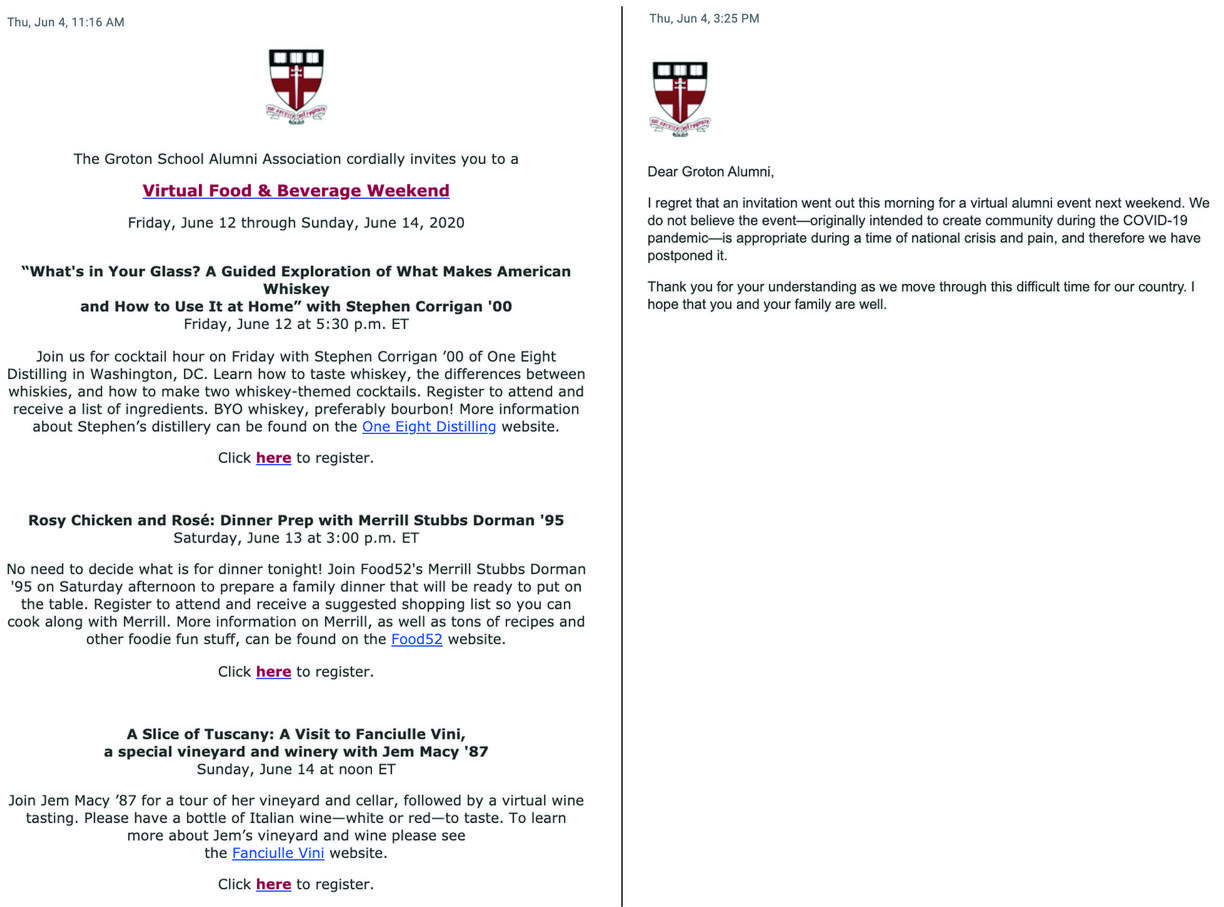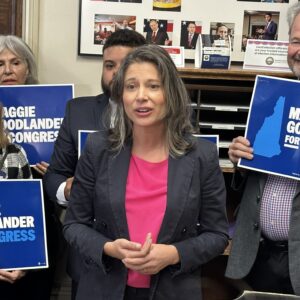As fiery riots swept across American cities in the summer of 2020, a group of outraged graduates of Groton, an elite, Massachusetts boarding school, demanded the administration donate hundreds of thousands of dollars to activists supporting those protests.
Among the organizations to be funded were groups advocating defunding the police and releasing rioters arrested during the protests.
And among the Groton grads making the demands was future Democratic candidate for Congress, Maggie Goodlander (Groton ’05).

The story begins with an invitation from the Groton School Alumni Association to a virtual “Food and Beverage Weekend” featuring whiskey tastings and a cooking demonstration the weekend of June 12-14, 2020. The idea was to engage alumni in communal, if remote, events during the COVID-19 pandemic shutdown.
But the email invites arrived in the wake of the murder of George Floyd at the hands of a Minneapolis police officer.
Protests — some of which would devolve into riots — had already begun. Groton administrators quickly realized they had a “bad timing” problem on their hands and emailed a cancellation notice later the same day.
“We do not believe the event… is appropriate at this time of national crisis and pain,” they wrote, “and therefore we have postponed it.”
But it was too late. Angry alums organized a letter in response, accusing the Groton administration of a history of insensitivity to racial and social justice issues and issuing a list of demands in response.

“Groton is in a unique position to use its far-reaching network of immense wealth to materially support its purported ideological commitments both to antiracism and equality more broadly,” they wrote.
Among the demands were changes in the school’s curricula, insisting it “delve into the history of structural racism and must incorporate an understanding of how oppressive narratives continue to shape the way we all think.”
Another demand was more direct: Pay up.
Groton must “encourage and match donations” to “organizations providing frontline support to anti-racist efforts, such as The Movement for Black Lives, NAACP Legal Defense Fund, Color of Change, and Equal Justice Initiative,” for sums “up to $200,000 or greater.”
While the NAACP Legal Defense Fund is a mainstream, progressive organization with widespread support, the other organizations singled out by Goodlander and her fellow Groton alums represent a fringe that embraces policies many Americans find extreme.
For example, the Movement for Black Lives has a history of problematic views on Israel and the Jews. The organization’s policy platform included support for the anti-Israel “Boycott, Divest and Sanction” movement and accusations that America was complicit in “the genocide taking place against the Palestinian people” by supporting the “apartheid state” of Israel.
The Movement for Black Lives even joined an effort, along with the terrorism-linked Council on American-Islamic Relations, calling for cutting ties with the Anti-Defamation League (ADL) due to its support of Israel.
And Color of Change, which describes itself as “the nation’s largest online racial justice organization,” also runs a political action committee that has helped fund the campaigns of antisemitic members of Congress U.S. Reps. Rashida Tlaib (D-Michigan) and Ilhan Omar (D-Minnesota).
On crime issues, the groups Goodlander wanted to fund also support ending all cash bail, an experiment that critics say has already ended badly in New Hampshire; defunding the police; amnesty for all protesters, including those arrested during the riots and looting of 2020. They also back taxpayer-funded reparations for slavery.
Goodlander declined to respond to questions about the letter, or her support for the groups and their policies. She has, however, openly embraced identity politics, urging Granite Staters to vote based on the sex of the candidate and arguing that “it matters” if the Second Congressional District elects a woman, as opposed to a man.
Her opponent in the Democratic primary to succeed retiring U.S. Rep. Annie Kuster is former Executive Councilor Colin Van Ostern. Interestingly, while Goodlander leads Van Ostern by 10 points in the new St. Anselm College poll (41 to 31 percent), she’s trailing him among self-identified “very liberal” Democrats — the very people most likely to support these same far-left causes — 40 to 31 percent.
Republicans running in the Second Congressional District primary criticized Goodlander’s politics.
“It concerns me that the Democrat Party has embraced the idea of equity over merit, and separating society based on skin color, gender, and political views,” said Weare Republican Lily Tang Williams. “Using identity politics to divide citizens is a communist tactic I saw when I was growing up in Communist China.”
A campaign spokesman for Bill Hamlen, a Republican candidate from Hanover, told NHJournal that Goodlander’s endorsement “just reinforces what voters already know — she prioritizes the radical left’s agenda, not the people of the Second Congressional District.”
“Voters see what happens in big blue cities and states that defund their police — crime skyrockets and chaos ensues.”
And Vikram Mansharamani, Republican from Lincoln, added:
“This is nothing more than the usual identity politics nonsense that is tearing our country apart. I have fought back against identity politics in the boardroom and the classroom. When I was at Harvard, I was reprimanded for daring to say that America is a ‘Melting Pot’. When I served on corporate boards, I pushed back against DEI initiatives that diverted attention away from long-term shareholder value. I am not at all surprised that Maggie Goodlander supports DEI efforts and backs groups that want to defund the police.”
Goodlander’s actions four years ago may sound extreme to some voters today, but there was a dramatic shift to the left in the months after the George Floyd murder. Many political figures appeared to shrug off, or perhaps even sanction, rioting and violence.
In Boston at that time, protests devolved into clashes with police, vandalism, 40 arrests, looting, fires, and a summoning of the National Guard. Current Massachusetts Democratic Gov. Maura Healey, then the state’s attorney general, made headlines when she dismissed the violence in her remarks to the Greater Boston Chamber of Commerce.
“Yes, America is burning, but that’s how forests grow,” Healey said.
“Today’s protests are not a passing fad; they constitute a historically pivotal moment for antiracism that this country has arguably not seen since 1968,” Goodlander and other alumni claimed in their June 2020 letter. “Groton must not remain neutral.”





